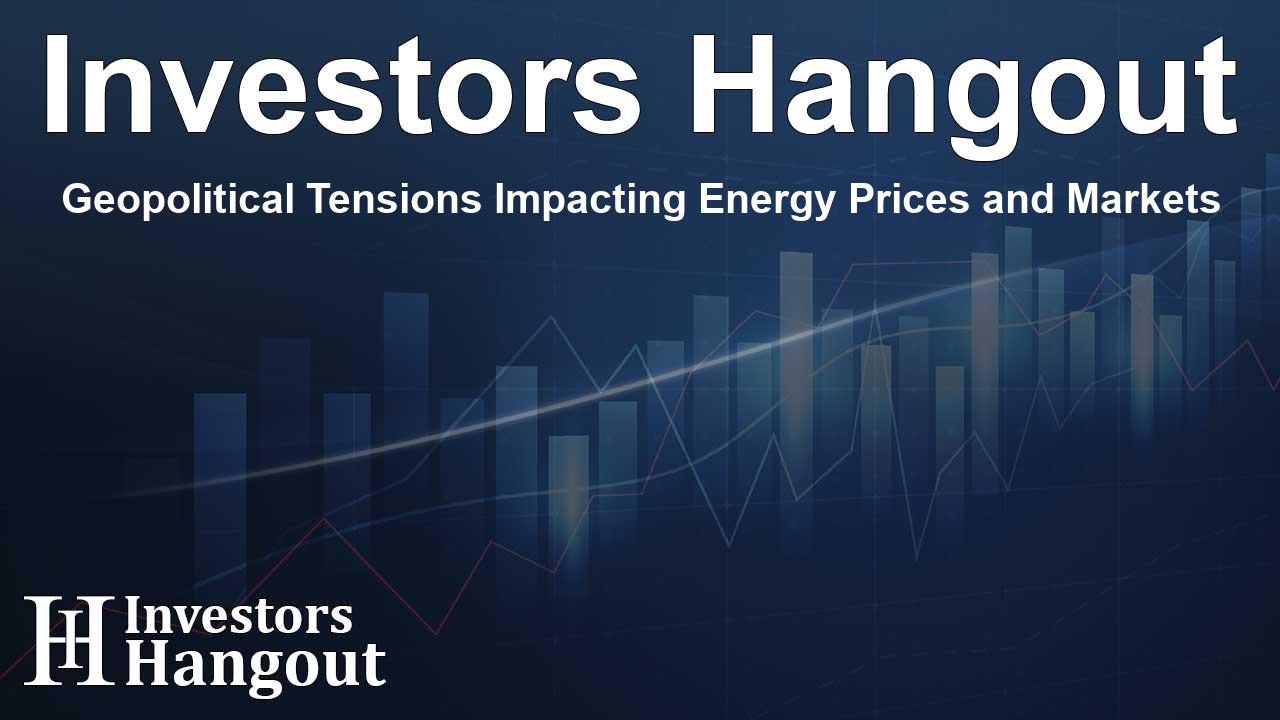Geopolitical Tensions Impacting Energy Prices and Markets

Geopolitical Tensions Impacting Energy Prices
Recent geopolitical tensions have once again stirred the global energy markets, creating a ripple effect on prices and consumer sentiments. With rising natural gas and oil prices, investors are expressing concerns about potential ramifications on the economy and specifically on U.S. consumer expenses.
As tensions escalated, news broke of Russia launching an intercontinental ballistic missile (ICBM) from its territory during an overnight strike on Ukraine. This action has raised alarms and caught the attention of many security experts who noted that this marks a significant use of an ICBM in a military context. Although there are no confirmations about the missile carrying nuclear capabilities, the mere act of launching such a weapon has heightened anxieties regarding the conflict.
Discussions between Western officials and various intelligence agencies highlighted differences in missile assessments. While Ukraine views the missile as a major threat, others suggest its range might be classified as intermediate. This variance underlines the complexities associated with analyzing military threats in real-time settings.
Weather Conditions Driving Up Natural Gas Demand
In the backdrop of these developments, U.S. natural gas prices have experienced a notable surge. Recent futures associated with the Henry Hub benchmark, a key measure of natural gas prices, saw an increase of over 6%, reaching $3.40 per million British thermal units. This figure represents the highest pricing level seen since November of the previous year.
As consumer demand for heating rises due to dropping temperatures and the approach of winter, natural gas remains critical for many households. The National Oceanic and Atmospheric Administration has also made predictions about significant snowfall in certain regions, further intensifying the demand for natural gas heating.
Forecasts suggest that November could witness a robust performance for natural gas, strengthening its position for the best monthly gains since mid-2022. This demand trajectory emphasizes the fuel’s crucial role in energy consumption during colder months.
European Market Supply Woes
Conversely, Europe's natural gas market faces its own challenges as it encounters fresh supply concerns leading into winter. Recent disclosures, notably from Austria’s OMV Group, indicate that the company will halt receiving volume from its long-standing contract with Russia's Gazprom. This development raises significant questions regarding supply adequacy and future pricing in the European market.
Oil Prices Climbed Amidst Rising Demand
Alongside the natural gas market, crude oil prices have also surged. The latest figures show West Texas Intermediate crude futures are on the rise, hitting approximately $70 per barrel—the highest it has been since the middle of last November. This climb reflects not just the direct impact of geopolitical events but also the overall trend of increased energy prices globally.
Simultaneously, gold has remained strong among investors looking for safe-haven assets. Rising demand has driven gold prices up by 0.6%, with the precious metal nearing an impressive $2,665 per ounce. Investors are closely monitoring gold as they seek refuge amid turbulent market conditions.
Cryptocurrency Market Reactions
The cryptocurrency market is also witnessing volatility, with Bitcoin rising by 3%, reaching a new peak of $98,367. This renewed enthusiasm in the cryptocurrency space adds yet another layer of complexity to the current investment landscape.
With fuel prices surging and inflation concerns lingering, the interconnectedness of these markets highlights the necessity for investors to remain vigilant and informed. The implications of such prices affect not only individual consumers but also significant economic indicators that could influence broader market conditions.
Frequently Asked Questions
What caused the recent spike in natural gas prices?
The rise in natural gas prices is largely attributed to geopolitical tensions and increased demand for heating as temperatures drop across the U.S.
How are geopolitical tensions affecting oil prices?
Geopolitical tensions, particularly surrounding Russia and Ukraine, have led to heightened market anxiety, resulting in increased crude oil prices as supply concerns grow.
What should consumers expect from energy prices this winter?
Consumers should anticipate potentially higher energy bills, especially for natural gas and heating oil, due to increased demand and geopolitical factors impacting supply.
Is gold still a safe-haven asset in today's market?
Yes, gold remains a popular safe-haven asset for investors amid market volatility, with recent price increases showcasing its ongoing appeal.
What impact do supply issues in Europe have on the global energy market?
Supply concerns in Europe could exacerbate global energy prices, creating additional stress on international energy supply chains and consumer costs.
About Investors Hangout
Investors Hangout is a leading online stock forum for financial discussion and learning, offering a wide range of free tools and resources. It draws in traders of all levels, who exchange market knowledge, investigate trading tactics, and keep an eye on industry developments in real time. Featuring financial articles, stock message boards, quotes, charts, company profiles, and live news updates. Through cooperative learning and a wealth of informational resources, it helps users from novices creating their first portfolios to experts honing their techniques. Join Investors Hangout today: https://investorshangout.com/
Disclaimer: The content of this article is solely for general informational purposes only; it does not represent legal, financial, or investment advice. Investors Hangout does not offer financial advice; the author is not a licensed financial advisor. Consult a qualified advisor before making any financial or investment decisions based on this article. The author's interpretation of publicly available data shapes the opinions presented here; as a result, they should not be taken as advice to purchase, sell, or hold any securities mentioned or any other investments. The author does not guarantee the accuracy, completeness, or timeliness of any material, providing it "as is." Information and market conditions may change; past performance is not indicative of future outcomes. If any of the material offered here is inaccurate, please contact us for corrections.